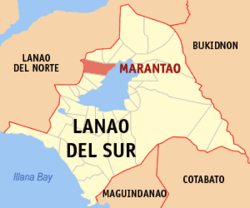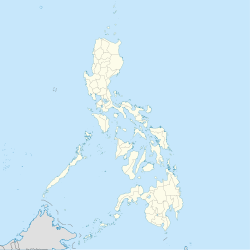Marantao, officially the Municipality of Marantao (Maranao: Inged a Marantao; Tagalog: Bayan ng Marantao), is a municipality in the province of Lanao del Sur, Philippines. According to the 2020 census, it has a population of 37,763 people.[3]
Marantao
مارانتاو | |
|---|---|
| Municipality of Marantao | |
 Map of Lanao del Sur with Marantao highlighted | |
Location within the Philippines | |
| Coordinates: 7°57′00″N 124°13′59″E / 7.95°N 124.233°E | |
| Country | Philippines |
| Region | Bangsamoro Autonomous Region in Muslim Mindanao |
| Province | Lanao del Sur |
| District | 1st district |
| Barangays | 34 (see Barangays) |
| Government | |
| • Type | Sangguniang Bayan |
| • Mayor | Akira I. Alonto |
| • Vice Mayor | Nashriph B. Cornell |
| • Representative | Ziaur-Rahman A. Adiong |
| • Municipal Council | Members |
| • Electorate | 33,014 voters (2022) |
| Area | |
• Total | 660.00 km2 (254.83 sq mi) |
| Elevation | 795 m (2,608 ft) |
| Highest elevation | 1,171 m (3,842 ft) |
| Lowest elevation | 696 m (2,283 ft) |
| Population (2020 census)[3] | |
• Total | 37,763 |
| • Density | 57/km2 (150/sq mi) |
| • Households | 5,909 |
| Economy | |
| • Income class | 2nd municipal income class |
| • Poverty incidence | 26.27 |
| • Revenue | ₱ 217.2 million (2020), 83.59 million (2012), 89.29 million (2013), 101.4 million (2014), 129.1 million (2015), 23.95 million (2016), 149.2 million (2017), 160.3 million (2018), 177.5 million (2019), 241 million (2021), 342.6 million (2022) |
| • Assets | ₱ 75.74 million (2020), 38.94 million (2012), 74.03 million (2013), 71.19 million (2014), 66.44 million (2015), 62.4 million (2016), 59.81 million (2017), 67.15 million (2018), 81.7 million (2019), 71.81 million (2021), 92.32 million (2022) |
| • Expenditure | ₱ 223.3 million (2020), 77.86 million (2012), 82.01 million (2013), 91.89 million (2014), 115.6 million (2015), 117 million (2016), 151.8 million (2017), 148.5 million (2018), 160.4 million (2019), 243.3 million (2021), 322.9 million (2022) |
| • Liabilities | ₱ 2.505 million (2020), 0.8507 million (2012), 32.53 million (2013), 28.28 million (2014), 19.66 million (2015, 2016), 15.36 million (2017), 11.07 million (2018), 2.49 million (2019), 0.8952 million (2021), 1.565 million (2022) |
| Service provider | |
| • Electricity | Lanao del Sur Electric Cooperative (LASURECO) |
| Time zone | UTC+8 (PST) |
| ZIP code | 9711 |
| PSGC | |
| IDD : area code | +63 (0)63 |
| Native languages | Maranao Tagalog |
| Website | www |
Marantao (Merantau) is a Malay word that means "to go on adventure, travel or hunting or even on a war expedition".
Geography
editBarangays
editMarantao is politically subdivided into 34 barangays. Each barangay consists of puroks while some have sitios.
- Bacayawan
- Cawayan Bacolod
- Bacong
- Camalig Bandara Ingud
- Camalig Bubong
- Camalig (Poblacion)
- Inudaran Campong
- Cawayan
- Daanaingud
- Cawayan Kalaw
- Kialdan Proper
- Lumbac Kialdan
- Cawayan Linuk
- Lubo Kialdan
- Inudaran Lumbac
- Mantapoli Kialdan
- Matampay Kialdan
- Maul
- Nataron
- Pagalongan Bacayawan
- Pataimas Kialdan
- Poona Marantao
- Punud Proper
- Tacub
- Maul Ilian
- Palao
- Banga-Pantar
- Batal-Punud
- Bubong Madanding (Bubong)
- Ilian
- Inudaran Loway
- Maul Lumbaca Ingud
- Poblacion
- Tuca Kialdan
Climate
edit| Climate data for Marantao, Lanao de Sur | |||||||||||||
|---|---|---|---|---|---|---|---|---|---|---|---|---|---|
| Month | Jan | Feb | Mar | Apr | May | Jun | Jul | Aug | Sep | Oct | Nov | Dec | Year |
| Mean daily maximum °C (°F) | 24 (75) |
24 (75) |
25 (77) |
26 (79) |
26 (79) |
25 (77) |
25 (77) |
25 (77) |
25 (77) |
25 (77) |
25 (77) |
25 (77) |
25 (77) |
| Mean daily minimum °C (°F) | 20 (68) |
20 (68) |
20 (68) |
20 (68) |
21 (70) |
21 (70) |
20 (68) |
20 (68) |
20 (68) |
20 (68) |
20 (68) |
20 (68) |
20 (68) |
| Average precipitation mm (inches) | 159 (6.3) |
143 (5.6) |
166 (6.5) |
183 (7.2) |
357 (14.1) |
414 (16.3) |
333 (13.1) |
309 (12.2) |
289 (11.4) |
285 (11.2) |
253 (10.0) |
166 (6.5) |
3,057 (120.4) |
| Average rainy days | 18.4 | 17.2 | 20.6 | 23.4 | 29.3 | 29.2 | 29.9 | 29.4 | 27.7 | 28.7 | 25.5 | 19.9 | 299.2 |
| Source: Meteoblue (modeled/calculated data, not measured locally)[5] | |||||||||||||
Demographics
edit| Year | Pop. | ±% p.a. |
|---|---|---|
| 1918 | 3,640 | — |
| 1939 | 6,783 | +3.01% |
| 1948 | 2,494 | −10.52% |
| 1960 | 13,720 | +15.26% |
| 1970 | 15,861 | +1.46% |
| 1975 | 16,496 | +0.79% |
| 1980 | 11,777 | −6.52% |
| 1990 | 18,404 | +4.57% |
| 1995 | 20,942 | +2.45% |
| 2000 | 24,647 | +3.55% |
| 2007 | 32,075 | +3.70% |
| 2010 | 28,550 | −4.15% |
| 2015 | 32,974 | +2.78% |
| 2020 | 37,763 | +2.70% |
| Source: Philippine Statistics Authority[6][7][8] | ||
Economy
editPoverty Incidence of Marantao
10
20
30
40
50
60
70
2000
52.84 2003
38.39 2006
33.00 2009
29.22 2012
60.20 2015
61.11 2018
67.27 2021
26.27 Source: Philippine Statistics Authority[9][10][11][12][13][14][15][16] |
Culture
editKawayan Torogan
editThe Kawayan Torogan is the oldest known torogan in the Philippines. It is a traditional Maranao house built for royal Maranao families. There was once a campaign where the people wanted the municipalities of Marantao and Tugaya to pass an ordinance where the architectural scheme of the two towns will follow only the totogan style, in effect, preserve the Maranao people's most royal architectural style and lead to the first two towns with a planned town landscape under an indigenous Maranao architecture. However, the campaign led to deaf ears due to little funding available.
References
edit- ^ Municipality of Marantao | (DILG)
- ^ "2015 Census of Population, Report No. 3 – Population, Land Area, and Population Density" (PDF). Philippine Statistics Authority. Quezon City, Philippines. August 2016. ISSN 0117-1453. Archived (PDF) from the original on May 25, 2021. Retrieved July 16, 2021.
- ^ a b Census of Population (2020). "Bangsamoro (BARMM)". Total Population by Province, City, Municipality and Barangay. Philippine Statistics Authority. Retrieved 8 July 2021.
- ^ "PSA Releases the 2021 City and Municipal Level Poverty Estimates". Philippine Statistics Authority. 2 April 2024. Retrieved 28 April 2024.
- ^ "Marantao, Lanao del Sur : Average Temperatures and Rainfall". Meteoblue. Retrieved 27 January 2019.
- ^ Census of Population (2015). "ARMM – Autonomous Region in Muslim Mindanao". Total Population by Province, City, Municipality and Barangay. Philippine Statistics Authority. Retrieved 20 June 2016.
- ^ Census of Population and Housing (2010). "ARMM – Autonomous Region in Muslim Mindanao" (PDF). Total Population by Province, City, Municipality and Barangay. National Statistics Office. Retrieved 29 June 2016.
- ^ Censuses of Population (1903–2007). "ARMM – Autonomous Region in Muslim Mindanao". Table 1. Population Enumerated in Various Censuses by Province/Highly Urbanized City: 1903 to 2007. National Statistics Office.
- ^ "Poverty incidence (PI):". Philippine Statistics Authority. Retrieved December 28, 2020.
- ^ "Estimation of Local Poverty in the Philippines" (PDF). Philippine Statistics Authority. 29 November 2005.
- ^ "2003 City and Municipal Level Poverty Estimates" (PDF). Philippine Statistics Authority. 23 March 2009.
- ^ "City and Municipal Level Poverty Estimates; 2006 and 2009" (PDF). Philippine Statistics Authority. 3 August 2012.
- ^ "2012 Municipal and City Level Poverty Estimates" (PDF). Philippine Statistics Authority. 31 May 2016.
- ^ "Municipal and City Level Small Area Poverty Estimates; 2009, 2012 and 2015". Philippine Statistics Authority. 10 July 2019.
- ^ "PSA Releases the 2018 Municipal and City Level Poverty Estimates". Philippine Statistics Authority. 15 December 2021. Retrieved 22 January 2022.
- ^ "PSA Releases the 2021 City and Municipal Level Poverty Estimates". Philippine Statistics Authority. 2 April 2024. Retrieved 28 April 2024.
External links
edit- Marantao Profile at the DTI Cities and Municipalities Competitive Index
- Philippine Standard Geographic Code
- Philippine Census Information
- Local Governance Performance Management System



